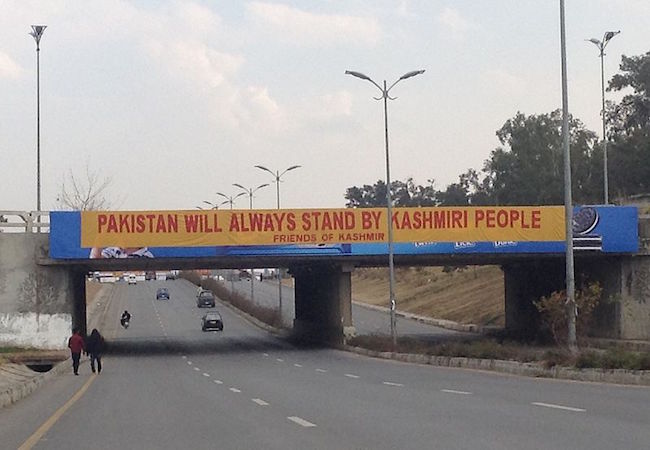Kashmir, an intractable conflict

By Saima Afzal
South Asia consists of seven states which include main actors India and Pakistan, the defacto nuclear weapon states. There has never been a smooth and cordial relation between the both states due to many issues and reasons and Kashmir dispute is one of them. The landlocked Kashmir territory lies in the northwestern part of Indian subcontinent. Kashmir is considered a most beautiful place on the earth. It is surrounded by the Uygur autonomous area of Sinkiang and Tibet on the northeast (both parts of China), on the South bordered by the Indian states of Himachel Pradesh and Punjab; on the northwest by Afghanistan and on the West by Pakistan. It became disputed territory between India and Pakistan after the partition of the subcontinent in 1947
5th February is observed as Kashmir Solidarity Day each year in Pakistan and also by the Kashmiri nationalists since 1990. The objective of celebration to this day is to pay the tribute to Kashmiri martyrs and to show the solidarity and harmony with the freedom fighters who are demanding their right of self-determination which is accepted and approved by the United Nation resolution. The international community should take into account the perspective of Kashmir people instead of India and Pakistan perspective in the resolution of Kashmir dispute.
There are few reasons that Kashmir issue should be resolve for the peace and tranquility in the South Asian region. Firstly, India and Pakistan have fought three wars. Secondly, this creates the sense of insecurity between both states which lead India and Pakistan to acquire nuclear weapon. Thirdly, the non-state actors get benefit from the situation and create atmosphere of disturbance and distrust between both states. Fourthly, humanitarian suffering among the inhabitants which has cost thousands of lives and affected the lives of millions in the region. Fifthly, wastage of economic resources of both states which can be utilize for poverty eradication, improvement of education and social well being of individuals.
However, in the last few years efforts have been made to find possible solutions of Kashmir issue, but unfortunately all these efforts failed to realize their objectives due to lack of political will by both India and Pakistan. Paradoxically, the Kashmiri people have never been given the chance to decide their fate in spite of United Nations Security Council resolution of 1948. The root of the conflict is the question of sovereignty and the possibility of self-determination by Kashmiris whether to remain in India, join Pakistan, or form an independent state.
However, few options can be opted for the settlement of Kashmir conflict. First, Kashmir should be given under the control of Trusteeship of UNO for ten to fifteen years. After a period of ten to fifteen years the matter may be referred to the people for the final verdict with regard to future status of the State. This arrangement will provide enough time to Kashmiris to decide their future without any pressure or compulsion from any country or group. Second option can be the Majority of Hindu Areas should be given to India and Muslim population areas should be given to Pakistan. Third, Kashmiri people should be given to the right of self-determination and they should decide their fate according to their wishes. Attempts at building trust, would be the first foundational step on setting out on the path for resolving what has been arguably the longest and perhaps the bloodiest running disputes in the world.
Kashmir is political issue it is not military issue so it should be resolved through negotiations and mediation. There must be cease fire before the negotiation and tripartite commission should be established that would consist of India, Pakistan and Kashmir. The major powers of the world USA, UK, Japan, China and Russia should play a role of mediator between Kashmir, India and Pakistan for quick and speedy resolution of Kashmir.
There cannot be amicable bilateral relations between India and Pakistan until the Kashmir issue is resolved in accordance with the wishes of Kashmiri people.




